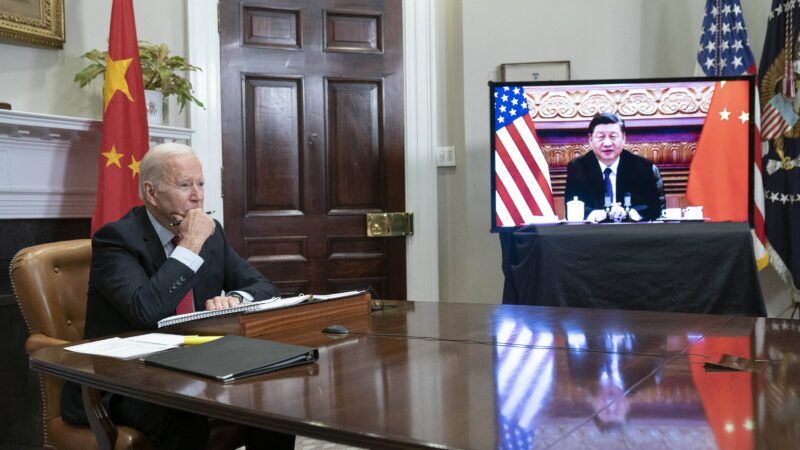Biden Escalates Trade War With China
A new national emergency declaration will allow for the creation of an outbound investment screening system targeting Americans' investments in China.

The Biden administration escalated America's trade war with China on Wednesday, as President Joe Biden declared a new national emergency and immediately used it as the justification for creating a new screening system that will limit Americans' ability to invest overseas.
The new rules, which have been in development since last year, will prohibit private equity and venture capital firms from investing in China-based businesses working in a variety of high-tech fields, The New York Times reports. The ban will apply to businesses working to develop artificial intelligence and those that build or develop semiconductors, the tiny chips that power modern computers. American investments that flow to other Chinese businesses will also be subject to new government scrutiny.
All of that springs from a vaguely worded executive order issued Wednesday afternoon. In that order, Biden declared the "rapid advancement in semiconductors and microelectronics, quantum information technologies, and artificial intelligence capabilities" by "countries of concern"—China is not mentioned by name—to be a national emergency. In response to the newly declared national emergency, Biden directed the Commerce Department and Treasury to design new rules governing outbound investments.
Congress, of course, will not be involved in the process.
"This narrowly targeted action will complement our existing export control and inbound investment screening tools, and protect our national security while maintaining our longstanding commitment to open investment," the Treasury Department said in a statement.
Narrow or not, this is the first time that the U.S. government has targeted outgoing investments in such a manner. As I reported in a feature published in this month's issue of Reason, the effort appears to be modeled on a similar screening system for inbound investments that was created in the 1970s and recently given greater powers. Biden administration officials, including National Security Advisor Jake Sullivan and Treasury Secretary Janet Yellen, have in recent months talked about the desire to limit how private sector investments flow between the U.S. and China—often blurring the lines between economic and military concerns.
The idea to create an outbound investment screening mechanism, Yellen said in a speech in April, was "driven by straightforward national security considerations. We will not compromise on these concerns, even when they force tradeoffs with our economic interests."
Biden's executive order echoed that framing—acknowledging the importance of global trade, but then declaring that vague national security concerns must be valued as more important. "Open global capital flows create valuable economic opportunities and promote competitiveness, innovation, and productivity, and the United States supports cross-border investment, where not inconsistent with the protection of United States national security interests," the president wrote. "However, certain United States investments may accelerate and increase the success of the development of sensitive technologies and products in countries that develop them to counter United States and allied capabilities."
Wednesday's announcement by the White House is a significant expansion of what the U.S. government considers to be under the purview of national security. It is in some ways similar to how former President Donald Trump flexed his executive power to declare steel and aluminum imports to be national security concerns. In both cases, the government's definition of what's in America's national security interest has been stretched wider so officials can have greater control over the private transactions of businesses and individuals.
"For a long time, the U.S. national security community has been reticent to recognize the international financial system as a potential warfighting domain," Claire Chu, a senior China analyst at Janes (a defense intelligence company) told The New York Times on Wednesday. "And the business community has pushed back against what it considers to be the politicization of private markets. And so this is not only an interagency effort, but an exercise in intersectoral coordination."
The U.S. Chamber of Commerce and other entities have raised similar worries, as I reported in the piece for this month's issue of Reason. There are only two other countries—South Korea and Taiwan—that have outbound investment screening systems, making Wednesday's announcement yet another blow to the global norm of free-flowing capital.
Though the specifics of the outbound investment screening system remain to be seen, there's no doubt that Wednesday's announcement is a significant escalation of the ongoing political conflict between the world's two largest economies. It is likely to end up being a massive power grab aimed at severing the peaceful exchange of money and goods across national borders.


Show Comments (50)